Results
-
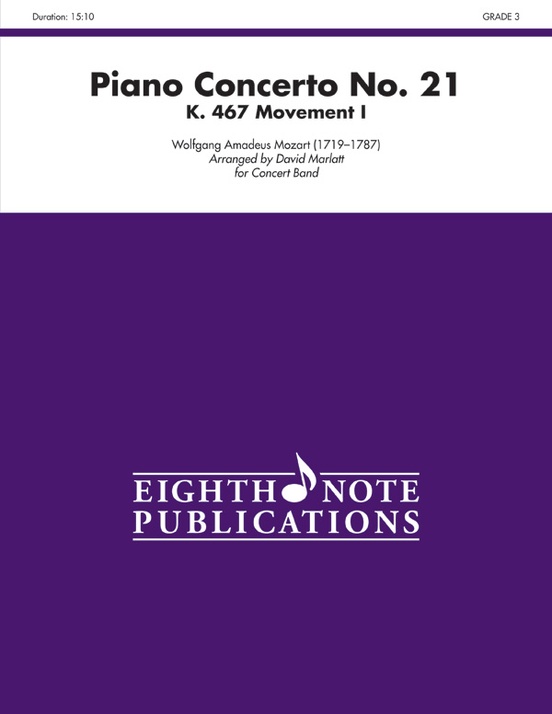 £82.95
£82.95Piano Concerto No. 21, K. 467 (Movement I) - Wolfgang Amadeus Mozart / arr. David Marlatt
This is an arrangement of the opening movement of one of Mozart's most popular piano concertos. The brass and woodwinds each get their share of not only key melodic ideas, but support of the piano soloist as well. This is a wonderful piece to allow a talented pianist to be featured in front of a band.
Estimated dispatch 3-5 working days
-
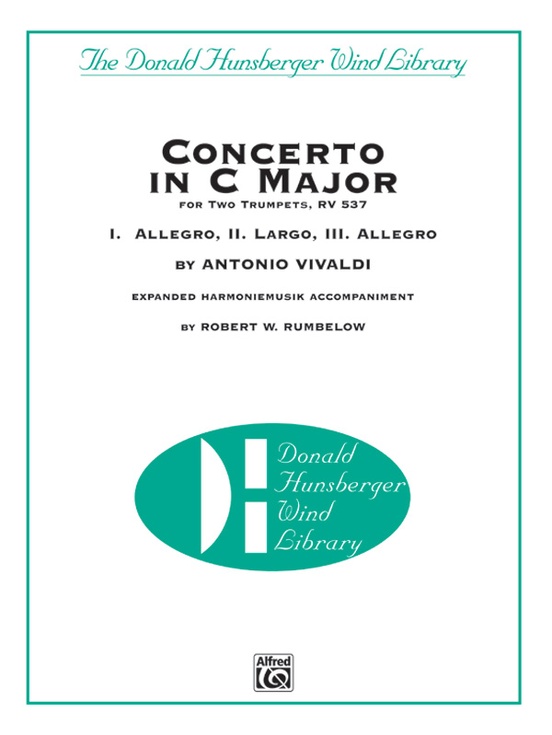 £195.00
£195.00 -
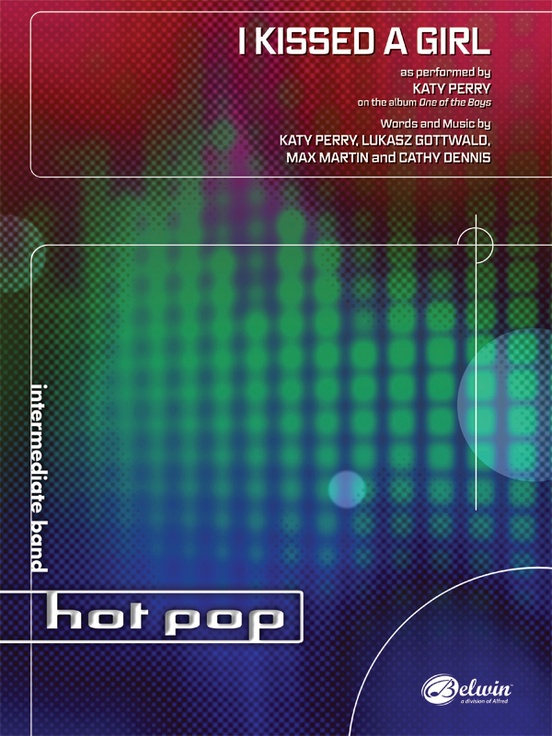 £50.50
£50.50I Kissed a Girl
Female rock sensation Katy Perry made her chart-topping debut with the hit single . Off her album , the catchy song rose to No. 1 on the Billboard Hot 100, and Katy's popularity solidified her as a true breakthrough artist of 2008. This energy-packed concert band arrangement has an 'edge' that will deliver today's hot pop right to your band room!
Estimated dispatch 3-5 working days
-
 £435.40
£435.40Goldberg 2012 - Svein H. Giske
The first time I heard Bach's Goldberg Variations was in the movie Silence of the lambs, in the early 1990s. I noticed the beautiful background music in one of the scenes, but at that time I didn't know what it was. A few years later, when I was studiying at the Grieg Academy, I got to know the entire piece. For me, this is a piece of music which I can listen to countless times. I think it sounds as fresh today as it did more than 15 years ago and it never ceases to inspire me. Both Bach's composition and Glenn Gould's famous 1955 recording (which was the first one I heard) still makes a great impression on me. Before Gould recorded it at age 22, it wasn't a highly ranked piece amongst pianists and Bach was by many viewed as a bit old-fashioned. The young Canadian turned all this around. He managed to portray Bach in a reformed way, producing fine nuances in phrasing and making the many layers in Bach's music more transparent than anyone before him. Thus he plunged both himself and Bach (back) onto the international music scene. When The Norwegian Band Federation (NMF) asked me to write the test piece for NM in 2012, it was only natural for me to use the Goldberg Variations as a starting point and inspiration for my work. Since I was a teenager at NMF's summer courses in the mid eighties I've always listened to many different styles of music. Growing up in Sunnmre with the Brazz Brothers as teachers and mentors, jazz-, pop/rock- and folk music were early on a natural part of my musical background. I also have my classical education from the Grieg Academy on trumpet. As the title of my piece implies, I've wanted to bring Bach to the present and put his music into various modern musical landscapes. I think you can bring about a special kind of energy when music from different genres are mixed and I've tried to do this by mixing Bach with artists and musical styles from the present. In Goldberg 2012, the music is often constructed by several layers, which in a way are living parallel musical lives. They are seemingly moving or floating freely, almost unaware of each other, but bound together by the same basic pulse. The rythms, however, are often notated on a different rythmic subdivision level than the usual 8th- or 16th note levels. By doing this, I hope to achieve transparent sounds that rythmically are perceived as more free and detached from each other. In large sections of the piece, pop/jazz is fusioned with elements from Bach. I guess you could have this little scene as a synopsis for the piece: picture a group of musicians meeting: some are classical performers, some are jazz. They start to improvise together, each in their own voice or musical dialect and I'm sort of in the middle, trying to write down what they are playing. This is what I feel much of Goldberg 2012 is about. The foundation of the piece, in addition to Bach and references from pop/jazz music, lies also in my own material. This material, basically two chords, is heard in it's purest form in the 1st movement. I use these chords to create scales, new chords and different motifs which contribute to blend together the different moods of the piece. It has not been my intention to copy Bach's form (theme and 30 variations), but rather to use the bits and pieces that I like the most as an inspiration for my own variations. The 1st movement, Aria 2, is for my 3rd son, Olav, who was born on the 21st of April 2011, and the 5th movement, From long ago, is dedicated to the memory of my father, Svein J. Giske, who passed away on the 6th of June 2011. -Svein H. Giske, January 2012-
Estimated dispatch 7-14 working days
-
 £123.40
£123.40Cherubic Hymn of Ukraine - Yakiv Yatsynevych
Ukraine was invaded on February 24, 2022, and the world again became spectators to a conflict between unequal opponents. Once again we saw lies, injustice and brutality up close.I must admit that a feeling of powerlessness arose when experiencing this, an empty feeling of not being able to do anything useful.One early Monday morning, a few weeks into the conflict, I sat down to listen to Ukrainian music.I hardly knew any Ukrainian music, but I was familiar with the composer Mykola Leontovych, the man who composed "Carol of the Bells". He was a member of the Ukrainian liberation movement, and he was assassinated by a Soviet agent in 1921.One of his contemporary colleagues was the composer, teacher and conductor Yakiv Yatsynevych (1869-1945). He wrote church music and choral music, and I became very taken by his Hymn to the Cherubim, a part of the Orthodox Mass.I could not find any sheet music for this. But I have listened to numerous choral recordings, and I have tried to notate the music as I believe the composer himself has done originally.I chose to do the arrangement for a solo group of 4 players. These players can be placed at a distance from the ensemble, maybe on a gallery or at the back of your concert hall.The arrangement was made for Brttum Brass for their participation in the Oslo Brass Festival in April 2022.The performance in the church this particular night was met with a long-lasting silence after the last note. The warm respect, the moving response and love we felt from the audience is a memory I will carry with me for a long time.In the lyrics to this psalm, one finds the phrase:Let us now lay aside all earthly cares- John Philip Hannevik - |
Estimated dispatch 7-14 working days
-
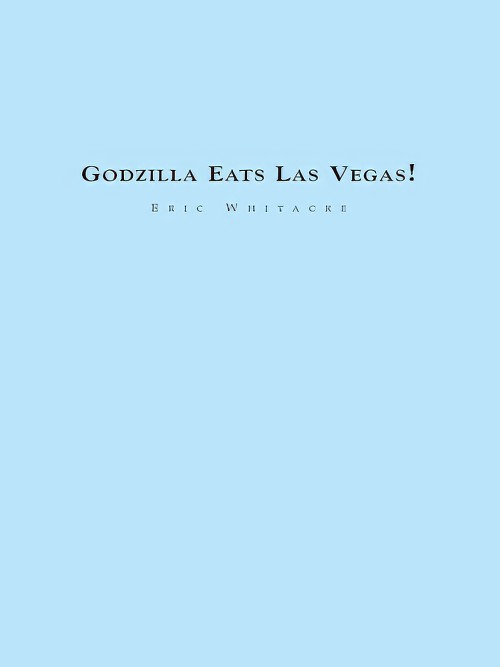 £189.99
£189.99Godzilla Eats Las Vegas (Concert Band - Score and Parts) - Whitacre, Eric
Note from Composer:It took me seven years to get my bachelor's degree from the University of Nevada, Las Vegas. By the time I graduated I was ready to eat Las Vegas.Tom Leslie asked me to write another piece for the group as I was leaving, and I thought it would be a blast to do something completely ridiculous. The players are called upon to scream in terror, dress like Elvises (Elvi), and play in about thirty different styles from mambo to cheesy lounge music. The audience follows a script that I wrote simulating a campy, over the top Godzilla movie (is there any other kind?).I wrote the bulk of the piece while in my first year at Juilliard, and no kidding, I used to act out the script every morning devouring animal crackers, wreaking havoc all over the breakfast table. The script was originally twice as long, and had an entire subplot devoted to a young scientist and his love interest. As I started to finish the piece, however, it didn't seem that funny and that story (along with an extended Elvis tribute) ended up on the cutting room floor.The idea that this piece is being played all over the world in such serious concert venues is the single funniest thing I have ever heard. It has been played on the steps of the Capitol by the United States Marine Band, by the Scottish National Wind Symphony (they play in kilts, so help me God), and I have a video of a Japanese audience visibly confused and shaken by the whole experience. Can you imagine? I'm laughing my head off even as I write this!Godzilla Eats Las Vegas! was commissioned by the University of Nevada Las Vegas, Thomas G. Leslie, conductor, and received its premiere November 28th, 1996.The performers are encouraged to go crazy: wear showgirl costumes, Elvis costumes, act out scenes on stage, use video and lighting - anything to get a laugh.
Estimated dispatch 7-14 working days
-
 £53.50
£53.50Palladio - Karl Jenkins
Although this composition sounds like it came straight out of the Baroque period, it is actually the first movement of a suite written in 1996 by Karl Jenkins. Instantly recognized as the 'diamond commercial' theme, its relentless pulse and dramatic nature make it a natural for bands. Robert Longfield's skilled arrangement puts it within reach of most groups.score and parts - 4 Flute I, 4 Flute II, 2 Oboe, 4 Bb Clarinet I, 4 Bb Clarinet II, 4 Bb Clarinet III, 2 Bb Bass Clarinet, 2 Bassoon, 2 Eb Alto Saxophone I, 2 Eb Alto Saxophone II, 2 Bb Tenor Saxophone, 2 Eb Baritone Saxophone, 2 F Horn I, 2 F Horn II, 3 Bb Trumpet I, 3 Bb Trumpet II, 3 Bb Trumpet III, , 3 Trombone I,3 Trombone II, 2 Baritone B.C., 2 Baritone T.C., 4 Tuba, I String Bass, I Timpani, 2 Percussion I, 2 Percussion II - wind/concert band
Estimated dispatch 7-14 working days
-
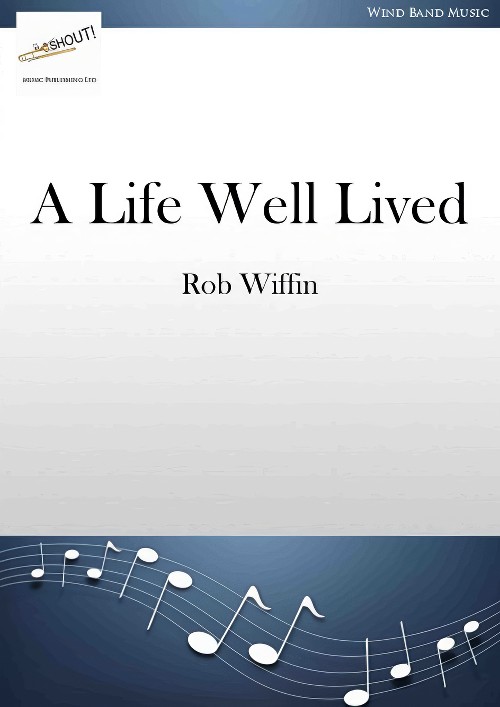 £49.95
£49.95A Life Well Lived (Concert Band - Score and Parts) - Wiffin, Rob
A Life well lived was commissioned by the Morrish family in 2023 on the death of Ian Morrish. It is dedicated to them with the inscription in loving memory of Ian.I knew Ian from early days at Southall Citadel Salvation Army Corps and then our paths crossed again briefly when I joined the Central Band of the Royal Air Force. Ian had been a euphonium player in the band for many years and was about to leave to take up a teaching post in Surrey. He was always very involved in choral music, conducting choirs throughout his life. I therefore wanted to keep this piece song-like and actually started with the song which appears from letter D to the end, which can always be performed on its own. From there I used the rising octaves that introduce the song to form the beginning of the work, with the feeling in the back of my head of a river starting to flow. There is nothing referential in the more dramatic sections towards the beginning, but every life has its dramas and I wanted something to give some balance to the tranquil nature of much of the piece. In the middle of the work I use a little motif taken from a song I remember Ian singing in his floating tenor voice. I develop the motif a little as an accompaniment to a new line which has, for me, a sense of purpose and directness and has an oblique reference to the RAF March Past. This builds to the aforementioned song and from there the music flows with its highs and lows to its peaceful conclusion.- Rob WiffinDuration: 3.30
Estimated dispatch 7-14 working days
-
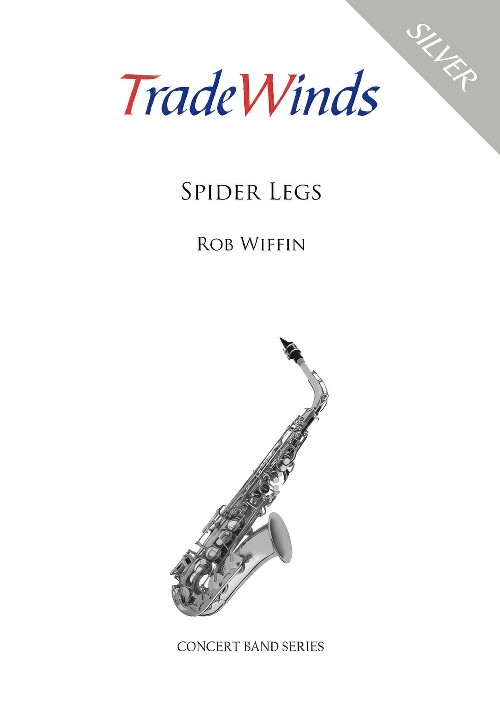 £54.95
£54.95Spider Legs (Concert Band - Score and Parts) - Wiffin, Rob
Spider Legs is a vibrant Latin dance number. Although I have used Latin rhythms in pieces in recent years this is the first time I have returned wholeheartedly to one of my favourite types of music since I wrote Tiptoe Tune in 2001. Typically I wrote it when I should have been writing something else but I really enjoyed going back to these rhythms. Stylistically Spider Legs can best be described I suppose as 'Merengue House' but perhaps it is better without any description! It was composed in 2014, shortly after the birth of my granddaughter Emma Louisa who was nicknamed 'Spider Legs' at the time and the name seemed to fit the music so well that I could not resist it.
Estimated dispatch 7-14 working days
-
 £10.95
£10.95Spider Legs (Concert Band - Score Only) - Wiffin, Rob
Spider Legs is a vibrant Latin dance number. Although I have used Latin rhythms in pieces in recent years this is the first time I have returned wholeheartedly to one of my favourite types of music since I wrote Tiptoe Tune in 2001. Typically I wrote it when I should have been writing something else but I really enjoyed going back to these rhythms. Stylistically Spider Legs can best be described I suppose as 'Merengue House' but perhaps it is better without any description! It was composed in 2014, shortly after the birth of my granddaughter Emma Louisa who was nicknamed 'Spider Legs' at the time and the name seemed to fit the music so well that I could not resist it.
Estimated dispatch 7-14 working days
